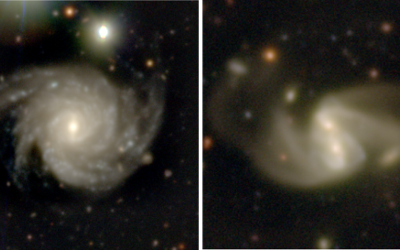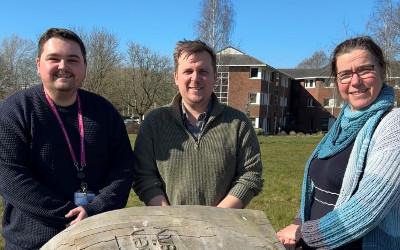OU researchers and partners release thousands of previously unseen space images

Popular citizen science project Galaxy Zoo has released 22,000 high-quality images to the public. Anyone in the world can help astronomers classify pictures taken with one of the most advanced instruments installed on one of the world's leading telescopes.
The international collaboration between Galaxy Zoo, The Open University (OU), the University of Hawaii (USA) and the University of Copenhagen (Denmark), including the National Centre for Nuclear Research (Poland), is releasing the deepest images of galaxies ever hosted for classification in Galaxy Zoo. This unique data set will allow the public to make exciting new discoveries of previously unseen and unclassified cosmic objects. In addition, these discoveries may result in more detailed follow-up observations using other world-class telescopes.
The invaluable contribution from citizen scientists will help astronomers improve their understanding of the evolution of galaxies over a significant fraction of the age of the Universe. The classifications of the H20/Cosmic Dawn data will help to identify previously unseen strong gravitational lenses when a foreground galaxy bends the light of a background galaxy. Finding these gravitational lenses will help astronomers refine their understanding of how the Universe works and how fast it is expanding.
The classifications will also help to better understand the role galaxy mergers play in the evolution of galaxies. Galaxy mergers are known to influence the star-formation rates of galaxies but exactly how and when this enhancement happens is still uncertain. With the classifications from this project, these changes can be narrowed down. Both gravitational lenses and galaxy mergers are rare and important phenomena for which having human eyes on the data can make a difference.
But this is not all. The classifications of the H20/Cosmic Dawn images will pave the way for science with future telescopes. The ESA Euclid mission, scheduled to launch next year, will make deep observations of the area in the sky containing the H20/Cosmic Dawn images. The classifications made by the citizen scientists will be indispensable to help learn about the Universe and guide the Euclid science teams.
James Pearson of the OU said:
“We are really grateful to the Hawaii Two-0 (H20) and Cosmic Dawn teams for providing us with their ultra-deep imaging containing new, more distant galaxies from earlier in the Universe’s history than previously seen on Galaxy Zoo.
“As a result, this latest iteration of the project, Galaxy Zoo: Cosmic Dawn, gives the public the opportunity to get involved in essentially real-time scientific discovery through classifying these never-before-seen galaxies! The H20 survey is also still ongoing, meaning more galaxy images are to come, so I encourage everyone to check out the project and join in!”
The H20/Cosmic Dawn survey is ongoing, and new images will be added to Galaxy Zoo as the survey progresses, providing the opportunity for the public to engage at the leading edge of scientific research. To help write the next chapter of astronomy, head over to Galaxy Zoo and start classifying today.
A version of this story, written by Laura Bandell, originally appeared on OU News.
You may also be interested in:
Quarterly Review of Research
Read our Quarterly Review of Research to learn about our latest quality academic output.

Contact our news team
For all out of hours enquiries, please telephone +44 (0)7901 515891
Contact details